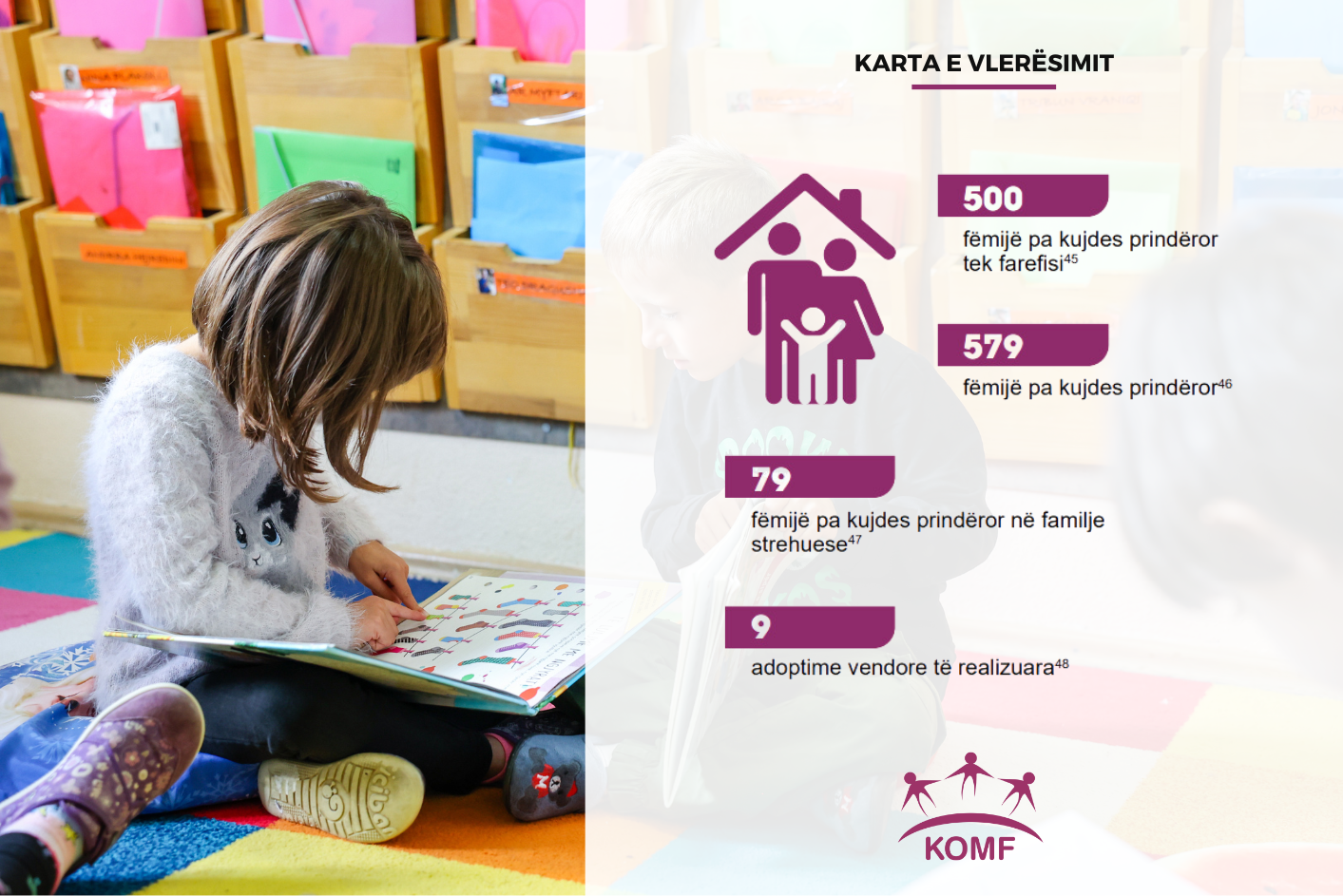
Children without parental care
The Law on Child Protection defines the protection of children without parental care through fundamental forms of legal and family protection: guardianship, foster care, residential care, adoption, and supervised independent living. In total 579 children without parental care were placed in foster care, in 2022. Meanwhile, 12 infant children were abandoned. It is worth mentioning that compared to the previous years, there is a decrease in the number of abandoned children. 500 children without parental care were placed in the homes of their relatives (kinship care). Whereas, 79 children were placed in foster families.
The Law on Child Protection foresees the component of prevention, determining that aspects which endanger child wellbeing and development must be prevented. Public, private institutions and non-governmental organizations, according to their mandate, should develop measures to prevent child’s need for help and reduce existing problems.
Main available services available from Centers for Social Work for children without parental care are assignment of the case manager and legal guardian, writing of the individual plan, placing the child in foster care or residential care, performing monitoring visits and performing reunification procedures or adoption. Monitoring visits cannot be carried out regularly by the Centers for Social Work due to the very large case load and the impossibility of reaching all the children. Whereas, majority of services such as rehabilitation, protection, reintegration, empowerment, professional training and independence, are provided by social service providers from civil society organizations, depending on which form of care the child is placed, foster family, SOS family/alternative care, residential care, or community-based house.
The small number of foster families is amongst the main challenges in protecting children without parental care. The Law on Child Protection defines that each municipality must have at least three foster families for children without parental care. However, foster families are not located in the entire territory of Kosovo, they exist in only 17 municipalities. Foster families are not specialized to work according to the categories of children.
Delays in resolving the status of children without parental care remains a challenge, thus children don’t have the opportunity to be adopted. This affects mainly children between ages of 3 and 18 who are without parental care, are placed in family or residential care for a very long time and are not considered for adoption. Kosovo is among the only countries in Southeast Europe with the lowest number of adoption cases of children older than 3 years per capita. Hesitancy of potential adoptive families to adopt children older than 3 years old, due to their requests to adopt children under this age, plays a role in the lack of adoption of this age group. Another challenge is lack of interest to adopt children with disabilities without parental care.
Even though the Law on Child Protection has foreseen the Supervised Independent Living as a new form which means provision of services and support for children without parental care after the age of 18 until the age of 26, this form of protection has not yet been implemented.60 Services for children without parental care after the age of 18 are largely lacking. Consequently, if a child cannot stay in the foster family after the age of 18, the Guardianship Body is obliged to stop the care and services, or in cases of children with disabilities, to place the child in the Institute of Shtime (residential shelter), which negatively affects the overall wellbeing of the child.
Foster care for children without parental care is considered to be one of the areas where the biggest progress in recent years has been achieved, in terms of legislation development, increased investments and capacity building. The new Law on Social and Family Services for the first time recognizes foster families as social services providers and paves the way for their inclusion in the pension scheme. Another positive step was the decision taken by Minister of Justice to increase payments for foster care.
Another positive step is the development of PRIDE international program, dedicated to capacity building of foster families, training for potential foster families and potential adoptive parents. This approach is expected to strengthen the quality of foster care and adoption services.
Recommendations:
- Establish and strengthening preventive programs and services aimed at family support, child abandonment prevention, separation of children from parents’ prevention, addressing risk factors that may lead to losing family care;
- Increase the number of foster families and extend them to all municipalities based on the Law on Child Protection, where it is provided that each municipality must have at least 3 foster families;
- Undertake actions by institutions to change the damaging practice of not adopting children over the age of 3 and children with disabilities, and increase awareness of potential adoptive parents;
- Specialize foster families according to the categories and increase capacities of foster families and potential adoptive parents;
- Develop and strengthen family services and community-based services, expand forms of protection, specifically, development of foster care after reaching the age of 18, through the development of a new form of protection: “Supervised independent living”;
- Provide continuous support, more frequent visits and rehabilitation as needed for children placed in kinship care;
- Provide scholarships by the Ministry of Education, Science, Technology and Innovation for children without parental care.

Recent Comments